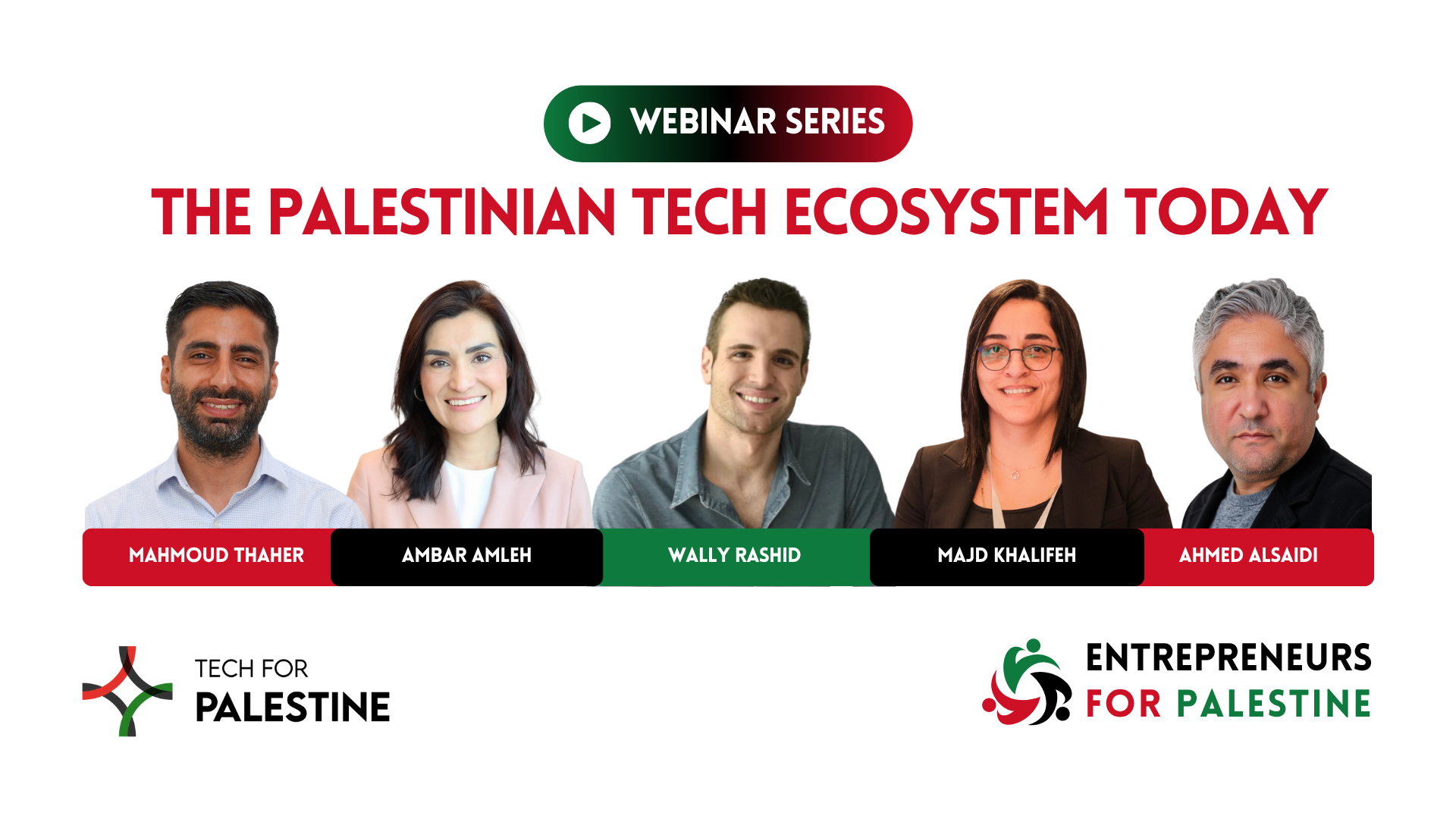Insights from our webinar: the Palestinian tech ecosystem today

“Some of our engineers were traveling 3 to 5 kilometers just to spend four or five hours in a place where there would be solar panels so they could do something for SellEnvo.”
Most of us can see the challenges Palestine faces – in survival and in business. But what we also want to highlight today, is the resilience, innovations, and aspirations of Palestinians in the midst of one of the cruelest and longest Nakba in history. And that’s what we tried to bring to light in the latest webinar of Entrepreneurs for Palestine – ‘The Palestinian Tech Ecosystem Today’.
The panel consisted of experienced VCs, accelerators, and entrepreneurs from the Palestinian ecosystem, and spoke about the challenges of tech entrepreneurs in Palestine and how they overcome them:
- Majd Khalifeh, Co-founder & Managing Director at Flow Accelerator, an incubator for Palestinian entrepreneurs.
- Ambar Amleh, Founder & Managing Partner at Ibtikar Fund, a VC catering specifically to Palestinian startups.
- Mahmoud Thaher, Co-founder & CEO at Turqat, an emergency roadside assistance company in the West Bank.
- Ahmed Alsaidi, CEO & Co-Founder at SellEnvo, a Gaza-based SaaS company for inventory and sales management.
Challenges Faced By The Palestinian Ecosystem
The panel discussed the challenges faced by the Palestinian tech ecosystem, and it was no surprise that the key issue is due to deep-rooted geopolitical constraints caused by Israel’s occupation and systemic infrastructure gaps.
Severe movement restrictions, particularly in Gaza, make even short domestic travel a logistical ordeal. In fact, even digital infrastructure suffers from GPS jamming and telecom disruptions. Therefore, essential functions like phone verification and developer account registration become a hindrance to providing services.
Importing and exporting hardware is nearly impossible, which has pushed many founders to pursue SaaS and tech-focussed models as a practical necessity rather than strategic preference.
Gaza’s chronic power outages by the occupation and restricted access to international markets further isolate tech workers and startups from the global economy.
Investment within Palestine remains painfully scarce, forcing startups to incorporate abroad, often as Delaware C-Corps or BVI entities, just to access funding.
All of these challenges, and more, have led to a slower growth of the Palestinian entrepreneurial ecosystem. But despite all odds, there’s been growth.
Innovation and Resilience Born Out of Challenges
The panel reminded us that entrepreneurs are resilient by nature, but Palestinian entrepreneurs are even more so.
Thaher spoke about how they handle geographic expansion by outsourcing work to regional contractors, allowing operations to move forward even when physical access is blocked. He also mentioned how in areas where GPS jamming and telecom disruptions made automated dispatch unworkable, they relied on a fallback system through call centers, proving how resourceful and flexible their model really is.
Khalifeh and Amleh both emphasised the importance of the Palestinian diaspora, not only as a major source of angel investment but also as a conduit to regional markets, offering mentorship and critical networking access. This is a crucial support by Palestine for Palestinians, which has enabled so much innovation to be born out of adversities the rest of us can only imagine.
Ahmed Alsaidi’s company, SellEnvo, is a stunning example of how excellence becomes the only viable option in such extreme conditions. His team in Gaza managed to keep operating through war, power outages, and displacement, sometimes working via solar panels, miles from their homes. Yet, SellEnvo has achieved major milestones with Amazon, and secured their first investment even in the middle of crisis.
Contrary to popular assumptions, investment in Palestine may actually present lower risk than expected. As Amber Amleh noted, most Palestinian startups incorporate as Delaware C-Corps or similar offshore entities, and hold their assets and IP outside of Palestine. This structure de-risks foreign investors significantly.
Also, World Bank programs like IPSD provide co-investment grants that effectively multiply the impact of early funding, further mitigating perceived geopolitical risks.
The panel spoke about the typical funding paths for entrepreneurs, funding sources, the support ecosystem, and much more during this hour. We came to realize that startups are not just surviving, they are building, scaling, and making it to international markets.
We encourage you to listen to the recording of the webinar to understand the ecosystem, and get practical advice both as an entrepreneur and as an investor.
